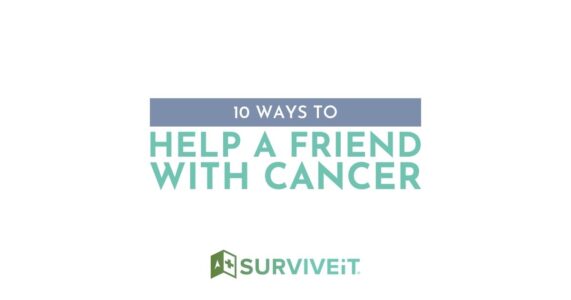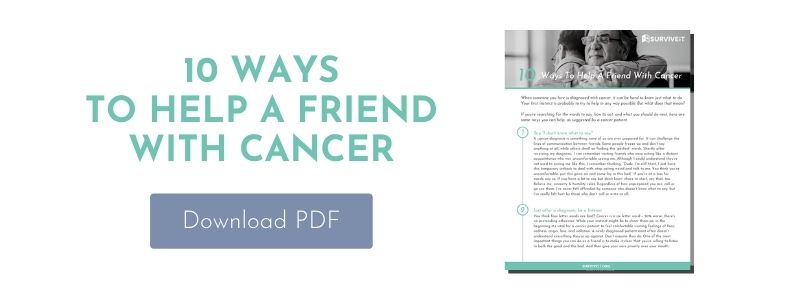10 Ways To Help A Friend With Cancer

When someone you love is diagnosed with cancer, it can be hard to know just what to do. Your first instinct is probably to try to help in any way possible. But what does that mean?
If you’re searching for the words to say, how to act, and what you should do next, here are some ways you can help, as suggested by a cancer patient.
(Want to print these tips? Download our 10 Ways to Help a Friend with Cancer PDF)
10 Ways to Help A Friend with Cancer
1. Say “I don’t know what to say”
A cancer diagnosis is something none of us are ever prepared for. It can challenge the lines of communication between friends. Some people freeze up and don’t say anything at all, while others dwell on finding the “perfect” words. Shortly after receiving my diagnosis, I can remember visiting friends who were acting like a distant acquaintance who was uncomfortable seeing me. Although I could understand they’re not used to seeing me like this, I remember thinking, “Dude, I’m still Matt, I just have this temporary setback to deal with, stop acting weird and talk to me. You think you’re uncomfortable, put this gown on and come lay in this bed.” If you’re at a loss for words, say so. If you have a lot to say but don’t know where to start, say that, too. Believe me, sincerity & humility rules. Regardless of how unprepared you are, call or go see them. I’ve never felt offended by someone who doesn’t know what to say, but I’ve really felt hurt by those who don’t call or write at all.
2. Just after a diagnosis, be a listener
You think four letter words are bad? Cancer is a six letter word – 50% worse…there’s no pretending otherwise. While your instinct might be to cheer them up, in the beginning it’s vital for a cancer patient to feel comfortable venting feelings of fear, sadness, anger, loss, and isolation. A newly diagnosed patient most often doesn’t understand everything they’re up against. Don’t assume they do. One of the most important things you can do as a friend is to make it clear that you’re willing to listen to both the good and the bad. And then give your ears priority over your mouth.
3. Give it your best thought (this is huge)
I wish I had a nickel for every time someone said “How can I help?” Although their intentions were always very sincere, cancer patients are often too tired or too polite to respond to that question. Take the lead by generating a list ahead of time and then ask specific questions. Without being pushy, you’ll find areas where you can step in:
- Do they need someone to look after them?
- Can they prepare their own meals?
- Who will go shopping for them?
- What about transportation to appointments?
- Who will mow their yard or shovel their walk?
- Are there other people needing help such as children or an elderly spouse?
- Do their children need rides to school? Extracurricular activities?
Put together a small list of areas where you feel you can help out and discuss that with the patient. Even if they have all those things taken care of, just knowing that you took the time to create the list means more to them than you will ever know.
4. Do What You Do Best
Do what heart tells you and you will never go wrong. Remember that the patient doesn’t expect you to show up with a magic show and pull a rabbit out of your hat. Use your skill sets and help by playing your strengths. If you love to cook, drop off a healthy homemade dish; if you’re an artist, make something to hang on the hospital or bedroom wall; if you’re spiritual, write them a prayer of encouragement; and if you’re an organizer, offer to gather research, help them navigate to a 2nd opinion, or to take notes during medical appointments.
5. “Please don’t write back”
After I received my diagnosis, I was graciously showered with the warmth of letters, emails and cards of support. These messages, filled with love and positive energy, were daily reminders that I wasn’t alone in this struggle. But finding the time and energy to write back to everyone was impossible. It gave me anxiety and feelings that others would see me as ungrateful for not writing back. You can dissolve any potential stress for the patient by reminding him or her that there’s no need to respond or write a thank-you note. Start your note with, “Please don’t write back, I was just thinking of you and wanted to send a note to say………”
6. We still like to laugh
While you should be careful joking about this six letter word (everybody’s sensitivity differs), some juicy gossip, a funny joke, or reminiscing about old times can go a long way in lifting someone’s spirits. If you’ve got some good stuff, bring it! Humor may feel out of place for many reasons, but don’t ever feel that you can’t be the bearer of good news. Trust me, even when you have cancer, it sure feels good to laugh.
7. Get engaged in the cause
When someone is diagnosed and treated with something they’ve never heard of, they are deeply moved by friends who have taken the time to learn about their disease. Become engaged in their cancer journey, be their eyes to research and read, organize a fundraiser (you could take a look at restaurant fundraising if you know they’re into their food), or donate a sum (however small) to cancer research or an organization of your choice. It’s a gesture acknowledging that cancer can affect anyone and you care enough to try to make a difference.
8. “It’s time for me to go”
Long visits don’t necessarily mean better ones. Visits needn’t be rushed, but please keep in mind that cancer fighters need their energy to fight cancer. They no longer have the same endurance level as you do. Be very attentive to signs that the patient needs to rest. It’s ok to say, “I really loved our time together today, get some rest and I’ll see you soon.” A good rule of thumb for a patient under treatment is to limit visits to 20 minutes.
9. Don’t forget the caregiver
Don’t forget the caregiver – When someone is diagnosed with cancer, life as they know it changes forever. But it also affects people close to them, especially their spouses and family. For a family member or caregiver, life as they know it has also just changed. Their daily routines and to-do list priorities have been hijacked. They too now are dealing with cancer. Although they often have more energy than the patient, and will do anything and everything for their loved one, they too need support. It may even come as a relief if they can find a reliable respite care to provide their loved one with care, even if it is for just a short span of time. Otherwise, they can quickly develop caregiver fatigue and need a substitution from time to time to allow them to recharge. They also need their friends to talk to. To discuss what issues they are dealing with and where they need help. Also, to have lunch or a glass of wine with the agreement “cancer” is not allowed in the conversation if that’s what the caregiver needs.
10. “I love you”
How many of us go through life thinking we have a limited amount of “I love you” statements to give? God has provided us all with more love than we can ever give in our lifetime. If there’s ever a time to tell a friend or family member how much you care about them, this is it.

